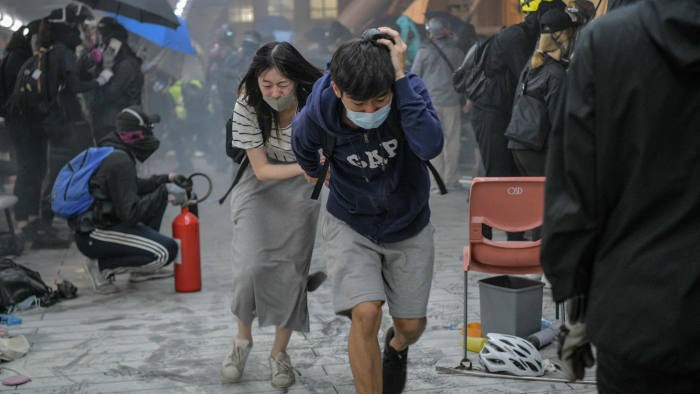
The elections are unlikely to put a stop to the months of often violent demonstrations © AFP via Getty Images Source: The Financial Times
For months, China has described Hong Kong’s protesters as “behaving like terrorists” manipulated by foreign forces against the will of a suffering population. On Sunday, the people of Hong Kong gave their verdict in the first vote since the demonstrations erupted in June. The outcome of the district council elections was a slap in the face for Beijing.
In one of the biggest voter turnouts in Hong Kong history, the pro-democracy camp won 17 of 18 districts — compared with zero in the last poll four years ago. Some of the most prominent pro-Beijing figures lost their seats while hardline democracy activists won theirs. Despite concerns of violence, the vote was peaceful. There were no clashes between police and black-clad protesters, just candidates and their supporters waving to passers-by.
The elections followed one of the most disruptive fortnights in the protests. Police laid siege to universities and protesters snarled up transport links, forcing schools to close. One of the sieges, at Hong Kong Polytechnic University, was still underway on Monday — a week after it began. The violence during the two weeks shocked a normally urbane city: police shot a protester at point-blank range, an officer was hit by an arrow and a man was set on fire. Analysts thought the incidents might weaken popular support for the movement. The district council elections have put paid to that speculation.
The councils lack political power, mostly advising the government on quotidian community matters. But the victory will give the pro-democracy camp new channels of influence. The winner of the district council elections can nominate six people to the Legislative Council, Hong Kong’s de facto parliament, and 117 people to the 1,200-member election committee of mostly pro-Beijing loyalists that selects the city’s chief executive.
If the pro-democracy camp can carry its current momentum through to the Legislative Council elections in 10 months’ time, it could conceivably win control of the house. That would be a nightmare scenario for Beijing, with a pro-democracy parliament hostile to the Communist party’s handpicked leader in Hong Kong.
The greater significance of the district council elections, however, is that they are the fairest and most direct vote in the territory. They are decided by simple majority, in contrast to the Legco poll that gives an outsized voice to business. This poll was a referendum on the protest movement.
The crisis facing the Hong Kong government and its Beijing masters has now deepened. An emboldened protest movement will press its demands even harder, including those for universal suffrage in the election of Hong Kong’s leader, an independent inquiry into allegations of police brutality, and an amnesty for the thousands arrested in the protests, many of whom the authorities have classified as rioters.
“The overwhelming support of pro-democracy candidates in these elections has given Carrie Lam, Hong Kong’s embattled chief executive, and her backers in Beijing, more than a bloody nose. It is one final call, to her and to Beijing, to ‘listen to us before Hong Kong is reduced to ruin’,” said investment group Pearl Bridge Partners in a note.
One solution might be for Beijing to offer political reform. This would not be unprecedented. In 2014, President Xi Jinping made a proposal according to which Beijing would provide a list of screened candidates for the leadership. Hong Kong voters would be able to elect one of them by direct vote. This was rejected by the pro-democracy camp but Beijing could try to produce another plan for consideration. That at least would raise the prospect of a political solution to the city’s dilemma.
The most likely result, however, is that the Communist party will continue to crackdown. The past months will have convinced Mr. Xi that Hong Kong cannot be trusted with the autonomy it already enjoys, let alone any more.
“This is David against Goliath! Hurrah!” tweeted one supporter of Jimmy Sham, a pro-democracy candidate who was beaten by thugs with hammers ahead of the elections. Perhaps, but it will take more than one stone to defeat the Goliath of Beijing. Hong Kong’s days of tear gas and rubber bullets are not over.
Source: The Financial Times, November 26, 2019 | Joseph Leahy